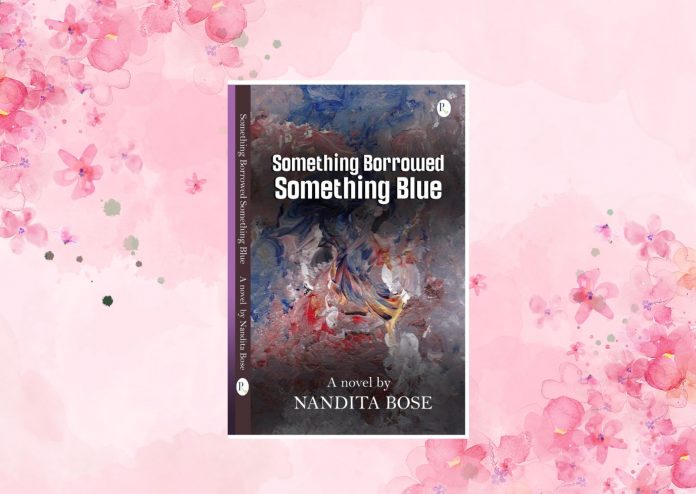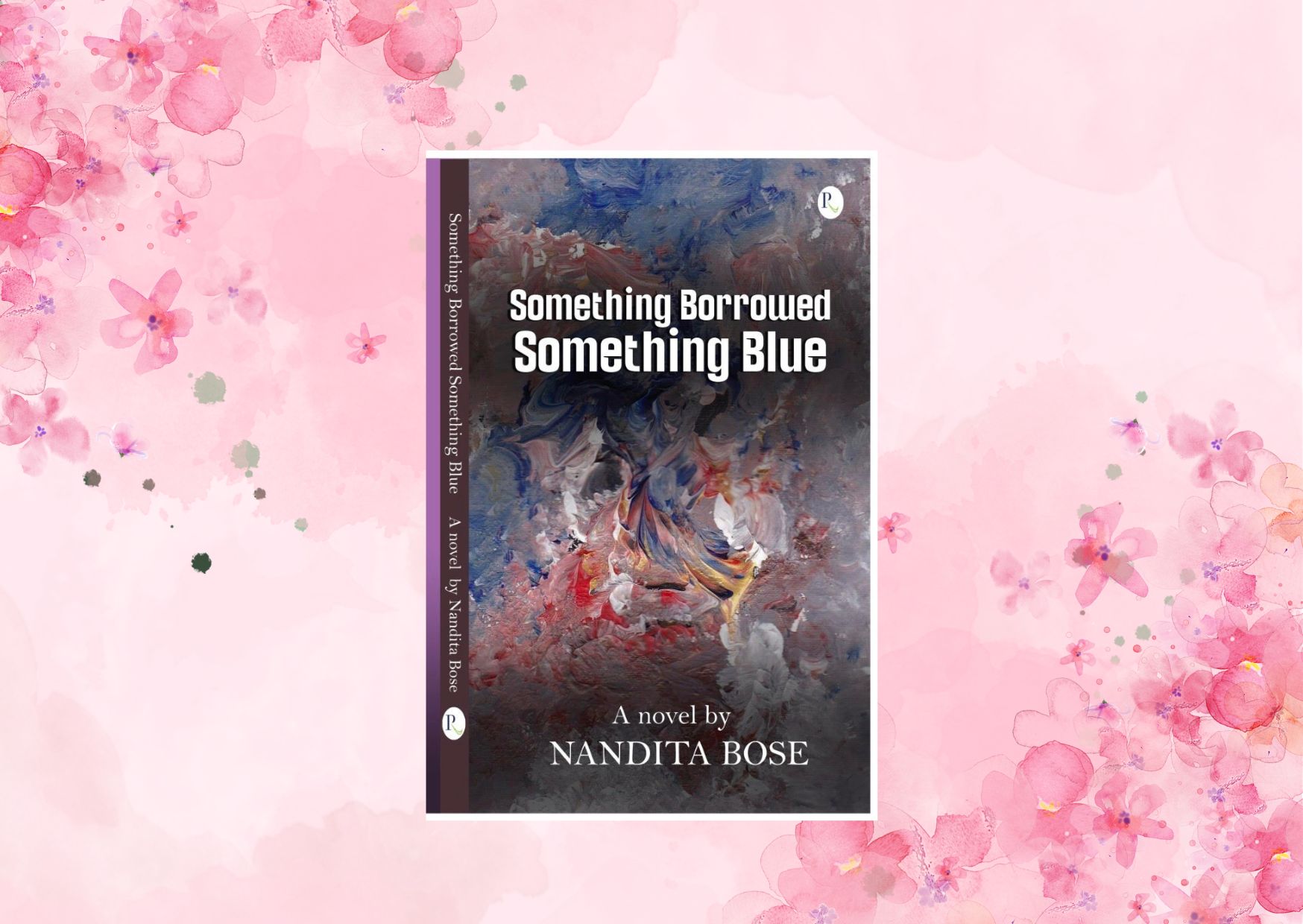Something Borrowed Something Blue
by Nandita Bose
Publisher: Rubric Publishing (2022)
‘Something Borrowed Something Blue’ comes in a hardback with hues of red, white and yellow against a riveting cobalt blue. Nandita Bose pens a persuasive drama that explores themes of age-old social norms, patriarchy and marriage. Set against the austere backdrop of Andul, SBSB is a riveting work of fiction that delivers a remarkable love story.
We meet the protagonist, Preeta for the first time while she is travelling to the modest Mirpuri Village in 2013. She’s off to meet a mysterious school teacher, only to find out it was Sagar, her brother-in-law. His fascinating wife’s idea of introduction meant condemning Preeta, “we don’t meet our elder brothers alone, yet alone travelling so far to see them”. This initially sets the foundation for age-old practices, traditions and mundane belief systems that are explored through the course of the novel. The story stirs up the stigma around patriarchy, sexism and misogyny, but we’re only just getting started.
Almost immediately, we backtrack to a flashback: we’re in 2009, in a meagre pocket of a town, Jibbonagar. The town’s almost as dreary as it sounds and the author accurately states: “The ways and the haste of the metropolis pass us by”
It’s often sentences like these that reveal more about Preeta, considering she keeps her conversational dialogue to a minimum. In what seems like the normal life of a college student, Preeta finds herself on her porch, playing a cricket match during a bandh. This gives way for the malevolent Inspector- Gagan Sinha to hatch a devious plan. After an argument on the street leads to a marriage proposal, Preeta is married to the inspector who is considerably older than her. The now coveted Preeta is packed up and sent away in 3 months and twenty days, bidding goodbye to her education and any potential dreams.
Caught in the shackles of a horrifying marriage, Preeta struggles to cope in her new house with everyone strong arming her. Sagar and Preeta’s brother, Ritesh remain the two sources of light that help her stay mildly sane. Sagar or ‘Dada’ as he initially asked to be addressed emanates machismo and compassion, unlike his obnoxious brother. Neel is a frail yet sturdy man, his Ma’s “eternal sorrow” as he best likes to be described. He is also the family “head” that has responsibilities tugging away at his shoulder after losing their father 13 years ago.
Preeta is forced into a hostile environment by her in-laws, and Sagar is but a faint light at the end of the tunnel. She is to drape itchy sarees and learn to cook fish in permutations and combinations of jubilant Bengali spices. Preeta almost blends seamlessly into the Sinha family’s customs and remains docile, as passively conveyed by her biological family and Ma. An unforeseen death in the family sends this routine for a toss, forcing Preeta to endure more societal obligation and blame. She is coerced to make a choice that may or may not inevitably destroy her.
The story explores the following themes: forbidden love, overcoming societal barriers, dealing with a patriarchal society and kindling hope through a destitute Preeta who remains resilient through all her hardships.
”I realise only much later all I had was a strange mixture of giggly, girly fantasy and scientific snippets stolen from blank books on reproductive health”
Preeta’s world is ordained with simplicities and the abrupt change in plans alters her life permanently. She is agonizingly lonely for someone with five sisters and a brother. She becomes a victim of prejudice and is constantly disciplined. She finds friendship in her plants, her house help, Tushki and otherwise is away meticulously cooking a dish. But the routine only goes on for so long. One can’t help but sympathise with Preeta and her adversities. The sheer lack of control over her life and the dearth of a support system almost swallow her whole.Preeta is subjugated to poor treatment from her parents & siblings alike, excluded from the comforts of her home, has no friends, and is barred from family events. Preeta is an outcast, owing to her gender and is bound by social norms. As the story progresses, Preeta’s experiences imbue in her, a sense of numbness and acceptance.
“Men in our society are born to fulfil a number of prophecies. Women are born for just one purpose: to serve men.”
In her college days, Preeta is at the dawn of her possibilities. All of 20, eager and curious. This is all brought to a screeching halt because a Police Inspector shows interest in marrying her. Through no fault of her own, her fate is sealed, and the prophecy is decided.
Amidst all the family politics and discrimination, Ma’s regression and Preeta’s endless chores comprise her routine. That is, until another family member decides otherwise. Preeta is to cook meals when required and eventually forms a rapport with Ma through storytelling but she is to keep her wits to herself.
“Fix me. Fix how broke I am on the inside”
Sagar’s compelling persona and incessant efforts are enticing. The story throws light on a pivotal element, that of compatibility in a relationship. Preeta learns and unlearns the “red flags” in a relationship, recuperates her understanding of pleasure and revives herself. Her amiability is almost remedial.
In the end, we crave EQ, intimacy and comfort in a partner. This also highlights how often those who appear the most poised and organised may be bearing the most weight of generational trauma. It takes the right person to listen, reinforce and mend old behaviour patterns that may have been inimical. This story talks about new beginnings and makes for a refreshing read.
“Something Borrowed, Something Blue” succeeds in telling an unforeseen love story worth reading. It is a compelling story that explores Preeta’s life and the advances following her wedding. The author delves into the complicated relationship between outcasts and society at large: the narrative elaborates on Preeta’s struggle to confide in herself and choose love in the face of a myriad of social stigmas.
Above all, it is a serendipitous love story. What starts as a mere happenstance changes Preeta’s life by leaps and bounds. The twenty-year-old is married off to an utter stranger and what ensues is an unusual tale unencumbered by convention and certainty, and sees endearing developments. It is safe to say SBSB is a resounding reminder of the indelible power of love.







RELATED ARTICLESMORE FROM AUTHOR
Mithun Number Two and Other Mumbai Stories
Can’t
Minor Disturbances at Grand Life Apartments